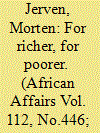|
|
|
Sort Order |
|
|
|
Items / Page
|
|
|
|
|
|
|
| Srl | Item |
| 1 |
ID:
145180


|
|
|
|
|
| Summary/Abstract |
We know less about growth and poverty based on numbers in African economies than we would like to think. Numbers are soft, and data availability is sparse, sporadic, and uneven. For researchers and data users, whether engaged in inferential or descriptive statistics, the message is that studying Africa by numbers can be misleading. This research note surveys the knowledge gap and provides guidance on how to and how not to study Africa by numbers.
|
|
|
|
|
|
|
|
|
|
|
|
|
|
|
|
| 2 |
ID:
118967


|
|
|
|
|
| Publication |
2013.
|
| Summary/Abstract |
ON 5 NOVEMBER 2010, GHANA STATISTICAL SERVICES announced that it was revising the GDP estimates upwards by over 60 percent, suggesting that in previous GDP estimates economic activities worth about US$13 billion had been missed. After the revision a range of new activities were accounted for, and as a result Ghana was suddenly upgraded from a low-income country to a lower-middle-income country. In the fall of 2011 Nigeria also announced a forthcoming upward revision of its GDP. Without presenting the public with any facts or figures, nor a date for the revision, it was announced by the director of the Nigerian Bureau of Statistics that Nigeria soon would join Ghana in escaping poverty according to official statistics.
|
|
|
|
|
|
|
|
|
|
|
|
|
|
|
|
| 3 |
ID:
093881


|
|
|
|
|
| Publication |
2010.
|
| Summary/Abstract |
It has been argued that the fundamental cause of Africa's current relative poverty is a lack of pro-growth institutions deriving either from the colonial system, the period of slavery, or from particular geographic or population characteristics. This article takes a fresh look at estimates of African country incomes. It subjects the available datasets to tests of accuracy, reliability, and volatility, and finds that there is very little to explain in terms of diversity of income between countries. With the exception of some resource-rich enclaves, a few island states, and South Africa, the income of one African economy is not meaningfully different from another. It is found that the majority of African countries should for all practical purposes be considered to have the same income level. The article therefore concludes that it is futile to use GDP estimates to prove a link between income today and existence of pro-growth institutions in the past, and recommends a searching reconsideration of the almost exclusive use of GDP as a measure of relative development.
|
|
|
|
|
|
|
|
|
|
|
|
|
|
|
|
| 4 |
ID:
103710


|
|
|
|
|
| Publication |
2011.
|
| Summary/Abstract |
This article traces how African incomes have been measured through history, and shows that there has been a conflict of aims between producers and users of national income estimates. Politicians and international organizations seek income measures that reflect current political and economic priorities and achievements. Thus the importance given to markets, the state, and peasants in the estimates varies through time and space. Meanwhile statisticians aim to produce a measure that gives the best possible reflection of the economy given the available data and definitions at any time. Scholars prefer a measure that is consistent through time and space so that 'progress' can be measured, compared, and analysed, while not being able to reach consensus on how 'progress' is best calculated or defined. The result is not an objective measure of progress, but rather an expression of development priorities determined by changes in the political economy. The article provides a much-needed study of the ability of the statistical offices to provide income statistics independently and regularly. These data are of crucial importance as they enter the public domain in policy evaluations, political debates, and progress towards lofty aims such as the Millennium Development Goals.
|
|
|
|
|
|
|
|
|
|
|
|
|
|
|
|
|
|
|
|
|